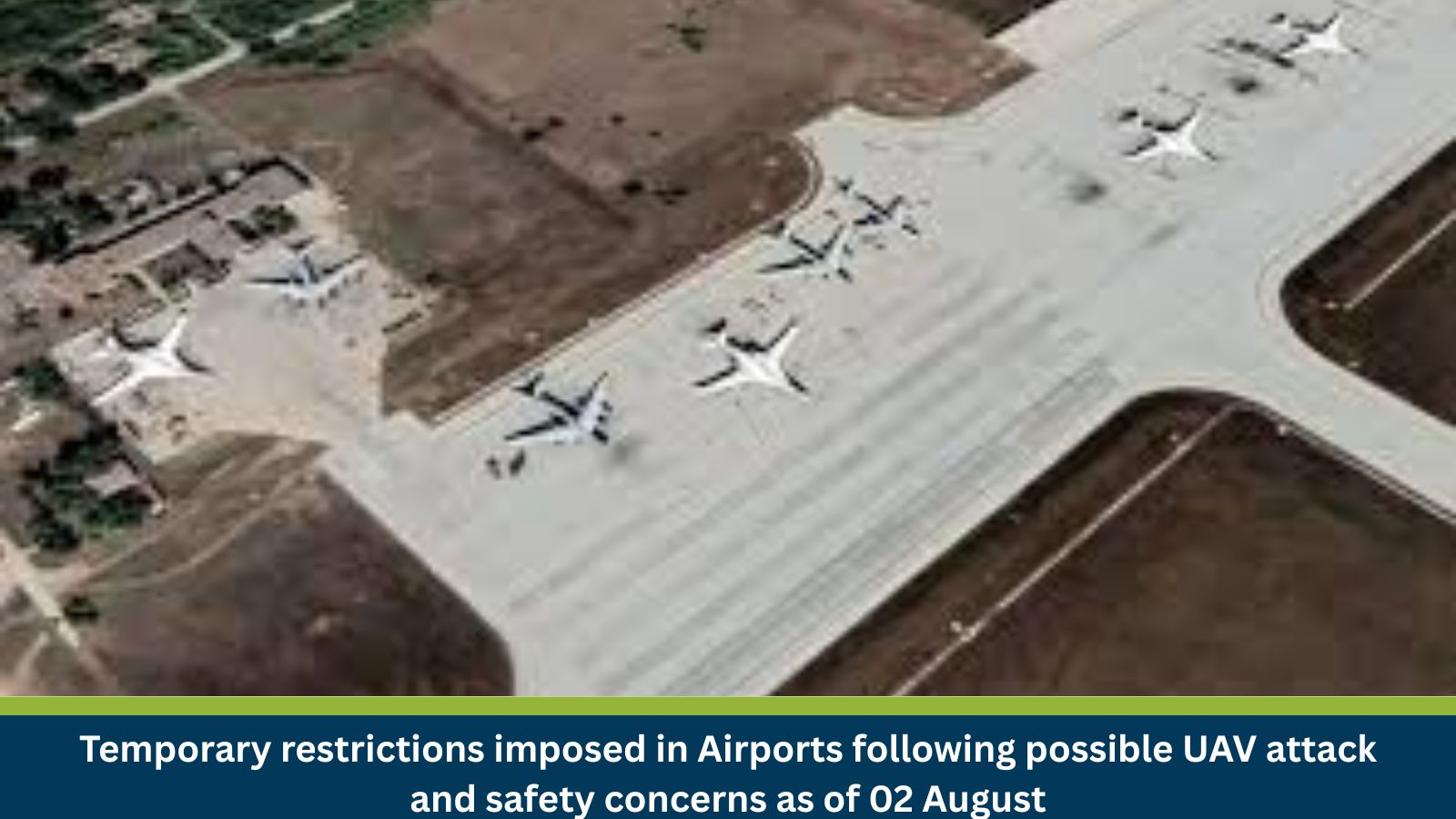This report assesses the risk associated with temporary airport restrictions in Penza, Samara, Saratov, and Tambov, following a possible UAV attack on Saturday, August 02. The underlying threat is persistent, but immediate impacts are expected to be short-lived, primarily affecting air travel and associated logistics.
What is Risk Analysis in the Context of External Threats Events?
This report assesses the risk from temporary airport restrictions in Penza, Samara, Saratov, and Tambov, following a possible UAV attack. Based on historical analysis of similar incidents, primarily related to the ongoing conflict in Ukraine and recurring drone threats, such restrictions are typically short-lived. This assessment helps to understand the short-term impact on business operations, travel, and logistics.
Executive Summary
- Date of Incident: 02 August 2025
- Location: Ukraine – Russia, Tambov Airports, Saratov, Samara, Penza, Ukraine, Russia
- Risk Category: External Threats
- Severity Score: 3/5
- Confidence Score: 85%
This report assesses the risk associated with temporary airport restrictions in Penza, Samara, Saratov, and Tambov, following a possible UAV attack. Based on historical analysis of similar incidents, such restrictions are typically short-lived, ranging from a few hours to 24-48 hours. The primary objective is precautionary. Past events indicate a pattern of localized and transient air traffic disruptions. The underlying threat remains persistent. We anticipate a low to moderate severity of immediate impact on air travel and associated logistics in the short term. The confidence in this assessment is high due to consistent response patterns.
Known Hotspots and Sensitive Areas
The primary sensitive areas are Penza Airport, Kurumoch International Airport (Samara), Saratov Gagarin Airport, and Tambov Donskoye Airport. The region, particularly Saratov, has been a target of previous drone attacks, including the strategic Engels airbase.
Impact on Transportation and Services
- Road Closures: Direct road closures are unlikely, but increased traffic congestion is anticipated on roads leading to the affected airports.
- Travel & Mobility: Significant disruption to air travel for both passengers and cargo is immediate, with potential cascading effects on ground transportation.
- Business Operations: Immediate impact includes disruption to airline schedules, cargo operations, and associated ground services, leading to delays and potential financial losses for air-dependent businesses.
- Supply Chain & Logistics: Air cargo operations for time-sensitive goods will be immediately impacted, potentially causing delays and requiring rerouting.
Recommended Actions
- Travel & Work Protocols: Immediately implement travel restrictions for non-essential business to/from the affected airports. Activate remote work protocols for employees in these areas.
- Supply Chain Review: Conduct an urgent review of all supply chain dependencies reliant on air cargo via the affected airports. Identify and activate alternative logistics routes.
- Communication: Issue proactive internal communications outlining updated travel policies and safety guidelines. Externally advise clients/partners about potential delays and provide virtual communication platforms.
- Security: Elevate physical security measures for company facilities near the affected regions. IT teams must ensure a robust cybersecurity posture.
Emergency Contacts
- Police: 102
- Fire Department: 101
- Ambulance: 103
- National Emergency: 112
Official Government Websites:
- Russian Ministry of Emergency Situations (EMERCOM): https://www.mchs.gov.ru/
- Government of Samara Region: https://www.samregion.ru/
- Government of Saratov Region: http://saratov.gov.ru/
- Government of Tambov Region: https://www.tambov.gov.ru/
Final Thoughts
The baseline scenario anticipates restrictions being lifted within 24-48 hours. A moderate escalation could see restrictions extended beyond 48 hours. A severe escalation, though less likely, would involve successful UAV attacks on air infrastructure, leading to significant damage and extended airport closures. Businesses must prioritize employee safety, review supply chain dependencies, and maintain effective communication to mitigate risks.
Stay ahead of operational risks with real-time alerts, scenario modeling, and expert advisories with datasurfr’s Predict.
MitKat helps organisations navigate uncertain times by providing comprehensive insights about the evolving risk landscape. We offer various services including Risk consulting and Security Design, Protective Services, and cyber security services which ensure organisations become Risk Intelligent. Our AI-powered operational risk monitoring tool, datasurfr combined with expert insight enables companies to stay abreast of evolving operational risks and emerging developments.






